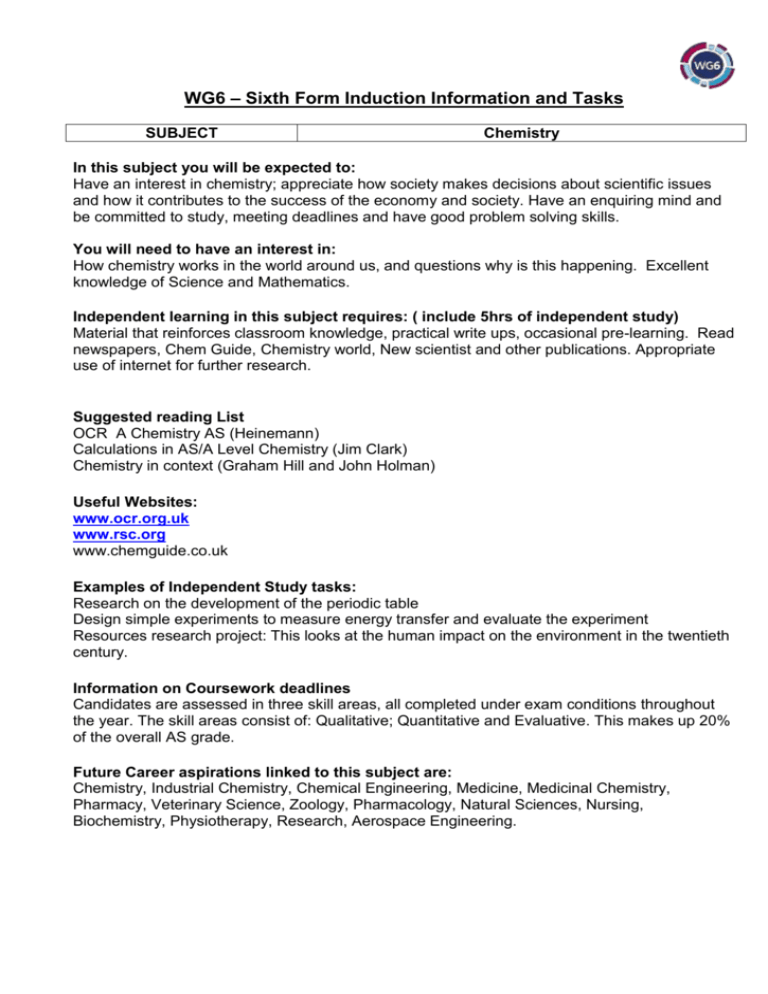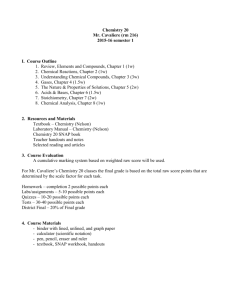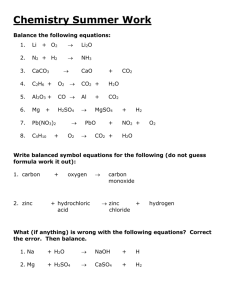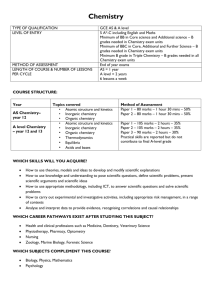Chemistry AS induction task
advertisement

WG6 – Sixth Form Induction Information and Tasks
SUBJECT
Chemistry
In this subject you will be expected to:
Have an interest in chemistry; appreciate how society makes decisions about scientific issues
and how it contributes to the success of the economy and society. Have an enquiring mind and
be committed to study, meeting deadlines and have good problem solving skills.
You will need to have an interest in:
How chemistry works in the world around us, and questions why is this happening. Excellent
knowledge of Science and Mathematics.
Independent learning in this subject requires: ( include 5hrs of independent study)
Material that reinforces classroom knowledge, practical write ups, occasional pre-learning. Read
newspapers, Chem Guide, Chemistry world, New scientist and other publications. Appropriate
use of internet for further research.
Suggested reading List
OCR A Chemistry AS (Heinemann)
Calculations in AS/A Level Chemistry (Jim Clark)
Chemistry in context (Graham Hill and John Holman)
Useful Websites:
www.ocr.org.uk
www.rsc.org
www.chemguide.co.uk
Examples of Independent Study tasks:
Research on the development of the periodic table
Design simple experiments to measure energy transfer and evaluate the experiment
Resources research project: This looks at the human impact on the environment in the twentieth
century.
Information on Coursework deadlines
Candidates are assessed in three skill areas, all completed under exam conditions throughout
the year. The skill areas consist of: Qualitative; Quantitative and Evaluative. This makes up 20%
of the overall AS grade.
Future Career aspirations linked to this subject are:
Chemistry, Industrial Chemistry, Chemical Engineering, Medicine, Medicinal Chemistry,
Pharmacy, Veterinary Science, Zoology, Pharmacology, Natural Sciences, Nursing,
Biochemistry, Physiotherapy, Research, Aerospace Engineering.
Induction
Task &
Success
Criteria
Complete ALL tasks
Success Criteria – A (80%), B(70%), C(62%), D(54%), E(46%), U(<46%)
Task 1: Calculations
1. A compound weighing 16.7g contains 12.7g of iodine and 4.0g of oxygen.
Calculate the empirical formula.{1 mark]
2. A compound contains 111.6g of iron and 48g of oxygen. Calculate the
empirical formula.[1mark]
3. Calculate the relative atomic mass for silicon to 3 significant figures, given
the following percentages 93% silicon-25, 5% silicon – 29, 2% silicon –
30.[2 marks]
4. Oxygen has 3 isotopes. What are the possible different oxygen molecules
you can get and what are their relative molecular masses? [1 mark]
5. Calculate the relative formula mass for each of the following: [2 marks]
Fe2(SO4)3
MgSO4.7H2O
6. Rearrange the formula V x C/1000 to make C the subject.[1 mark]
7. Complete and balance the following equations:
Fe2O3 + CO
Cl2 + I-
[4 marks]
8. Convert the following into grams [4 marks]
a) O.25Kg
b) 15Kg
c) 100tonnes d) 2 tonnes
9. Convert the following into dm3 [4marks].
a) 100cm3 b) 25cm3 50m3
50000cm3
Task 2: Research
Research and produce a scientific report for The New Scientist based on ‘Looking
for Patterns in Chemistry’.
The theories and ideas involved in the development of an atom’s structure would
give a fascinating insight into how science works. The scientific method is often
represented as the sequence of experiments, observation, analysis and
conclusion. The model of the nuclear atom – consisting of protons, neutrons and
electrons – is extremely useful and well accepted by the chemists and is firmly
based on sound experimental evidence. It is amazing to think that these
experiments all began with investigating particles that cannot ever be seen.
However, Science does advance. The nuclear model of the atom has now been
replaced and present models will also be replaced as Science advances further.
We have come a long way from the four elements of the ancient Greeks.
1. Describe how the model of the atom has changed over the years and how it
continues to do so?
2. How is scientific knowledge evolving?
3. Describe how new theories are accepted by the scientists?
Things to include:
Greek philosophers and the first idea of atoms and elements
a) John Dalton
b) Joseph John Thomson
c) Ernest Rutherford
d) Niels Bohr
e) Louis DeBroglie
f) Erwin Schrödinger
g) James Chadwhich
h) Hans Geiger
i) Ernest Marsden
[10 marks]
Task 3: Organic questions (based on GCSE)
Part 1 - Boiling point of alkanes (7 marks)
Part 2 - Alkanes and Alkenes (17 marks)
Part 3 - Cracking Hydrocarbons (11 marks)
Part 4 - Polymers (5 marks)
Deadline
First lesson in September







